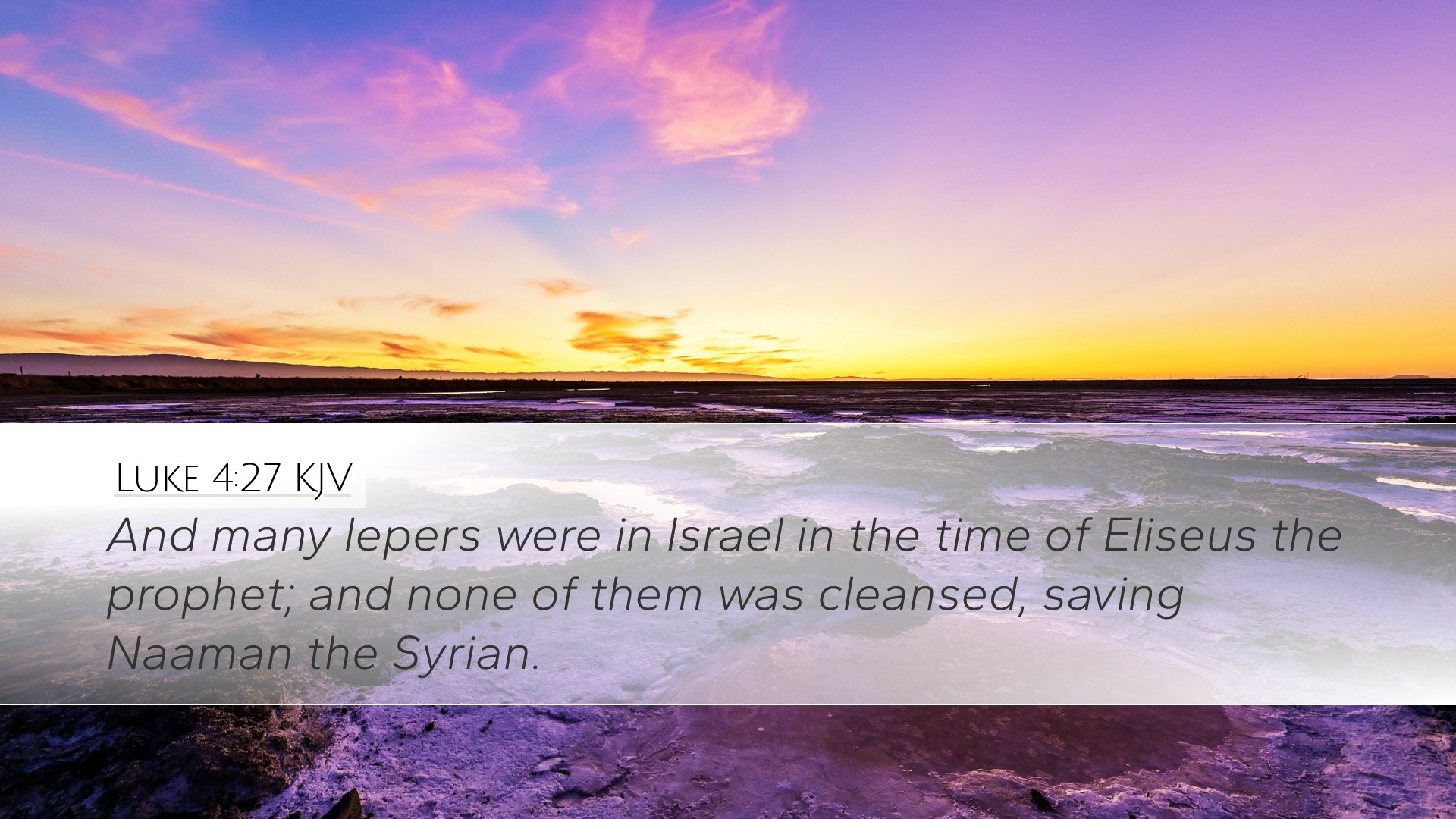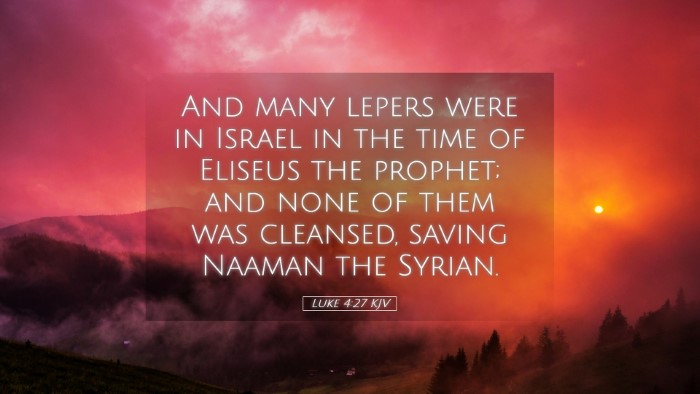Commentary on Luke 4:27
In the Gospel of Luke, chapter 4, verse 27, we encounter a statement made by Jesus that reveals profound truths about God's mercy and the ministry of salvation extending beyond the bounds of Israel. The verse reads:
“And many lepers were in Israel in the time of Elisha the prophet; and none of them was cleansed, saving Naaman the Syrian.”
This passage encapsulates a vital lesson regarding God's grace and the nature of His covenantal promise.
Summary of Key Insights
- Contextual Significance:
The surrounding verses in Luke 4 establish the rejection Jesus faced in Nazareth. His mention of Naaman serves to illustrate that God's grace can extend beyond the Jewish nation, a poignant reminder that the Gentiles too are included in God's plan.
- Elisha and Naaman:
Referencing the Old Testament, specifically the healing of Naaman, highlights God's willingness to cleanse and save those outside of Israel. Naaman, a Gentile and a commander of the Syrian army, demonstrates that faith and obedience, regardless of nationality, are key to receiving God's grace.
- The Nature of Leprosy:
Leprosy serves as a significant metaphor for sin and separation from God. As only Naaman was cleansed among many afflicted in Israel, it speaks volumes about the condition of the heart and the necessity for faith.
- God’s Sovereignty:
This verse serves as a reminder that God acts according to His divine wisdom and choice. It challenges the reader to consider their own assumptions regarding who is deserving of God's mercy.
Exegetical Insights
Matthew Henry underscores the fact that during Elisha's ministry, the lepers of Israel were not healed, emphasizing that God's covenant people can often miss out on His blessings through unbelief.
Albert Barnes notes the contrast between the many lepers in Israel and Naaman. He emphasizes that the miracle was not performed for the many, but for the one who had faith. Barnes draws attention to the idea that God's grace operates beyond human expectations, which is a central theme throughout scripture.
Adam Clarke elaborates on the types of leprosy in the biblical context and its significant implications for both health and social acceptance. He comments on the broader theological implications of God's mercy extending to the Gentiles, which should lead us to embrace a more inclusive view of God's work in the world.
Theological Implications
The healing of Naaman serves as a prophetic foreshadowing of the Gospel's reach to all nations. Jesus, in recounting this story, relays the revolutionary idea that the Kingdom of God is unfolding in ways that challenge the norms of Jewish exclusivity. It emphasizes:
- Universal Need:
All humanity is afflicted with the spiritual ‘leprosy’ of sin, and like Naaman, all are invited to seek healing outside of their own heritage or merit.
- Faith Response:
Naaman’s healing required an act of faith. The same is true for all individuals: responses to God’s call must be met with faith and obedience.
- God’s Grace is Unconditional:
Jesus illustrates that God's grace does not navigate human distinctions; it transcends cultural, ethnic, and social barriers.
Practical Applications
This verse invites pastors, students, theologians, and Bible scholars to reflect on the inclusivity of their ministry and the invitation of grace they extend to the world. It challenges the Church to embody the radical love of God, which seeks to heal and cleanse all who come to Him. Key reflections include:
- Self-Examination:
Consider personal biases or boundaries that might hinder the experience of healing and grace for others.
- Outreach Ministry:
In light of Luke 4:27, local churches should actively pursue outreach that reflects God’s mercy toward all communities, particularly marginalized or disenfranchised groups.
- Teaching on Faith:
Emphasize the importance of faith, as seen in Naaman, encouraging congregations to respond to God's directives even when they seem unconventional.
Conclusion
Luke 4:27 powerfully encapsulates the broader message of the Gospels, affirming God's unbounded grace and the call to faith that belongs to all who would seek Him. By examining the rich insights from public domain commentaries, we glean a deeper understanding of God's redemptive plan which transcends all boundaries and invites everyone into His fold.


